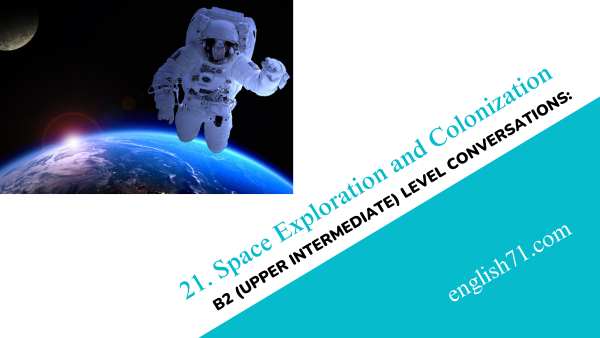B2 (Upper Intermediate) level Conversations: (21)Space Exploration and Colonization

Paul: Hey Sarah! Have you been following the latest developments in space exploration?
Sarah: Absolutely, Paul! It’s fascinating to see how far we’ve come. Did you catch the recent news about plans for space colonization?
Paul: Yes, I did! The idea of humans establishing a presence on other planets is mind-blowing. Imagine a future where we’re not confined to Earth.
Sarah: It’s both thrilling and daunting. The technological advancements needed for space colonization are immense. Do you think it’s a realistic goal?
Paul: Realistic, yes, but it comes with its challenges. Sustainability, life support systems, and the long-term effects on human health are crucial aspects to consider.
Sarah: True, and the ethical dilemmas around potentially altering other planets’ ecosystems raise important questions. How do you feel about the commercialization of space exploration?
Paul: It’s a double-edged sword. On one hand, private companies bring innovation and funding, but on the other, we need international collaboration to ensure responsible exploration.
Sarah: Agreed. Speaking of international collaboration, do you think there should be a unified effort in space exploration, or is competition healthy?
Paul: Ideally, a balance. Healthy competition can drive progress, but pooling resources for big, collaborative missions could yield more impactful results.
Sarah: Absolutely. Now, thinking about everyday life in space, how do you think people would adapt to living in a space colony?
Paul: It’s a major lifestyle shift. Artificial gravity, closed-loop ecosystems, and psychological support systems would be crucial for a sustainable space community.
Sarah: And what about the social aspects? How would individuals cope with the isolation and confinement?
Paul: That’s a challenge. Recreation, communication, and creating a sense of community would be vital for mental well-being in the confined space of a colony.
Sarah: Switching gears a bit, what do you think about the potential discovery of extraterrestrial life? How might that impact our perspective?
Paul: It would be a game-changer, Sarah. The mere possibility of life beyond Earth challenges our understanding of the universe and our place in it.
Sarah: Agreed. It could unite humanity in a shared awe for the cosmos. But there might also be fear or cultural clashes. How do you think society would handle it?
Paul: It’s a delicate situation. Open dialogue, respect for different perspectives, and global cooperation would be crucial to navigate the implications.
Sarah: Wrapping up, what’s your personal take on space exploration and colonization? Do you see it as a necessity for humanity’s future?
Paul: I see it as a natural progression. Exploring beyond our planet is part of our curiosity and drive for survival. But it must be done responsibly, considering the impact on both space and Earth.
Sarah: Well said, Paul. It’s been a thought-provoking conversation. Who knows what the future holds for us in the cosmos?
Paul: Indeed, Sarah. Let’s keep our eyes on the stars and stay curious about the mysteries of the universe.



Summary:
In their discussion on space exploration and colonization, Paul and Sarah delved into the thrilling possibilities and challenges associated with humanity’s ventures beyond Earth. They explored the feasibility and ethical considerations of space colonization, emphasizing the importance of international collaboration and responsible exploration. The conversation touched on the potential discovery of extraterrestrial life and its profound impact on human perspectives. Paul and Sarah also considered the social and psychological aspects of living in space, highlighting the need for supportive systems to ensure the well-being of future space communities. Overall, the conversation provided a nuanced exploration of the future of space exploration and its implications for humanity.

